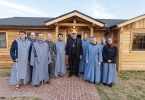by John Huertz
KANSAS CITY, Mo. — “The Lord calls married couples to be his sacrament of love for each other,” Archbishop Joseph F. Naumann told participants in the World Marriage Day Mass on Feb. 12, “but also to be an instrument of evangelization for the world.”
The archbishop concelebrated the Mass at St. Therese Parish in Parkville, Mo., with celebrant Bishop Robert W. Finn of the Diocese of Kansas City-St. Joseph. The Mass was co-sponsored by the office of family life in both dioceses.
Couples from throughout both dioceses, many with children in tow, renewed their marriage vows at the Mass.
“Family life, founded on the committed, faithful love of a married couple,” the archbishop said in his homily, “is the principal social institute of transmitting the principles and beliefs, of fostering the virtues and values, that are the foundation for culture and society.”
Brad and Libby DuPont of the archdiocesan family life office echoed his sentiments at a reception following the Mass.
“Marriage is for the good of the couple,” said Brad DuPont, “and then for the good of the community. When marriage operates as God designs it, it is a great source of his power and love.”
Archbishop Naumann said that when people are first married, “not being able to know or see what lies in front of them — what kind of challenges and problems they will encounter — they promise to love each other, no matter what the future may hold.
“To be able to love in this unconditional way—not just for a day or a season or a year, but for a lifetime — requires the grace of God. It is not possible to be able to love in the manner that Christian marriage requires without God giving one the strength and generosity.”
Basing his homily in part on the Gospel reading for the day — Jesus healing the leper — the archbishop also pointed out that, for Christians, “the path for redemption leads to Calvary.”
In her remarks at the reception, Libby DuPont tied the theme of the day in with the feast of Our Lady of Lourdes, a special day of prayer for the sick celebrated the day before. Blessed John Paul II discussed the intimate connections between human love, God’s love, salvation as liberation from evil, and the problem of suffering in his apostolic letter “Salvifici Doloris,” she said, which addressed the complexities of human suffering and was issued on the feast of Our Lady of Lourdes in 1984.
“In ‘Salvifici Doloris,’ John Paul II said that suffering unleashes love,” said Libby DuPont. She illustrated the pope’s insight with a story from her own life as a wife and mother.
Two of the DuPont’s four children died only a few months after birth — Peter in 2005, and Gianna in 2008.
“The parish found out about Gianna and it unleashed a great deal of love, because people came to us to tell us about children they had lost,” she said.
“Then the teens started telling us about their own hurts,” she added, “such as that ‘my dad never wanted me.’ Then people started coming back to church.”
Thus did a married couple become God’s instrument for turning sorrow into a way to share the good news with those around them, she said.
“We believe as Catholics that suffering matters,” said Libby DuPont.
“I wait for the day when my kids take my hand in heaven and say, ‘Mom, look at all the places where the grace went.’”
World Marriage Day began in 1981, when couples in Baton Rouge, La., persuaded church and civic officials to proclaim St. Valentine’s Day as “We Believe in Marriage Day.”
The name was changed and the event moved to the second Sunday in February in 1983, and Blessed John Paul II gave it his apostolic blessing 10 years later.
“World Marriage Day is emblematic of the emphasis we want to put on sup- porting marriages,” said the archbishop.






